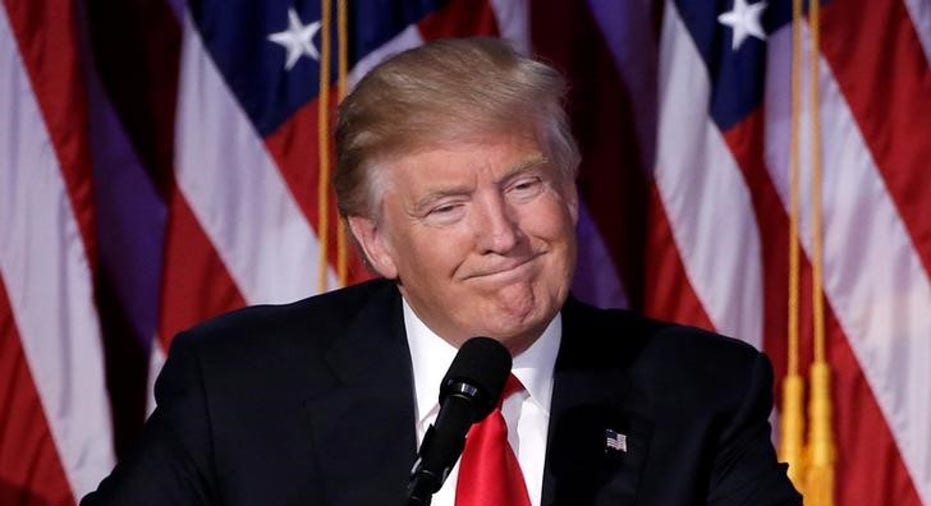What's on the GOP's Wish List for 2017?

Republicans are poised to use their newly attained capitol dominance to make Missouri the 27th right-to-work state prohibiting mandatory union fees. That is unless Kentucky's recently crowned GOP majorities can beat them to it.
The race to expand right-to-work laws is just one of several ways that Republicans, who strengthened their grip on power in the November elections, are preparing to reshape state laws affecting workplaces, classrooms, courtrooms and more during 2017.
As President-elect Donald Trump leads an attempted makeover in Washington, Republican governors and state lawmakers will be simultaneously pushing an aggressive agenda that limits abortion, lawsuits and unions, cuts business taxes and regulations, and expands gun rights and school choice.
Republicans will hold 33 governors' offices, have majorities in 33 legislatures and control both the governor's office and legislature in 25 states — their most since 1952. Democrats will control both the governor's office and legislature in only about a half-dozen states; the rest will have politically divided governments.
"Really, the sky's kind of the limit," said Sean Lansing, chief operating officer at Americans for Prosperity, the conservative group bankrolled partly by billionaire industrialists Charles and David Koch. "It's really the best opportunity in quite some time to accomplish a lot of big ticket items — not just in one or two states, but in five, 10 or 15."
Democrats did make some gains in the recent elections, most notably by defeating Republican North Carolina Gov. Pat McCrory and winning both chambers of the Nevada and New Mexico legislatures. But in all three of those states, Republicans still control at least one branch of government.
While officials in Democratic strongholds such as California and New York pledge a vigorous fight against Trump's agenda, some Democrats elsewhere seem resigned to get steamrolled on policies they long have opposed, such as right-to-work laws that undercut the financial strength of unions, a traditional Democratic ally.
In Missouri, term-limited Democratic Gov. Jay Nixon previously vetoed a right-to-work measure passed by the Republican-led Legislature. But he's being replaced Jan. 9 by Republican Gov.-elect Eric Greitens, who promised to sign a right-to-work law. GOP legislative leaders have placed it atop their agenda. And their ranks are strengthened following a campaign season in which businessman David Humphreys poured more than $12 million into Missouri candidates and political committees that backed right-to-work.
"Oh, it's going to happen," said Senate Minority Leader Gina Walsh, a retired union laborer who is president of the Missouri State Building and Construction Trades Council. She added: "I'm not willing to lay down on it yet, but I'm also a realist."
Assuming right-to-work will become law, Missouri AFL-CIO President Mike Louis already is preparing for the next battle. He has filed several versions of a proposed initiative petition that would ask voters in 2018 to approve a constitutional amendment reversing right-to-work by ensuring that unions can negotiate contracts requiring that employees pay fees for their representation.
Republican Kentucky Gov. Matt Bevin also hopes to sign a statewide right-to-work law in 2017, now that Republicans who already hold the Senate also have won control of the House for the first time in nearly a century. A dozen Kentucky counties already have passed local right-to-work laws.
Right-to-work supporters also are targeting New Hampshire, where Republican Gov.-elect Chris Sununu will be paired with a GOP-led Legislature. And collective bargaining restrictions for public employees could be on the agenda in Iowa, where the Republican governor will work with a Legislature that will be under full GOP control when lawmakers reconvene in January.
Bevin said Kentucky Republicans will pursue "things that have been bottled up for years and need to at least have votes on them," citing school choice measures and "reform" proposals for pension, tax and litigation laws, among others.
The aftermath of the November elections has particularly raised the hopes of school choice advocates. They support tax credits for families who opt for private over public schools and vouchers that allow public tax dollars to pay for private-school tuition. They also want to expand public charter and magnet schools to give parents additional choices.
Trump pledged during the campaign to spend $20 billion during his first year in office to help states expand school choice programs, and he wants states to divert an additional $110 billion of their own education budgets toward the cause. His pick for education secretary is Betsy DeVos, chairwoman of the school choice advocacy group American Federation for Children.
The federation's political arm backed 121 state and local candidates this year, winning in 108 of the races, said spokesman Matthew Frendewey. Now it's focusing on at least a dozen states— nearly all of which have Republican-led legislatures — where it believes school choice laws could be enacted or expanded in 2017.
"The environment is ripe for this, and there's a hunger for expanding choice and creating more educational options for families," Frendewey said.
Republican leaders also are planning to use their statehouse power to pursue a variety of pro-business proposals, including reduced regulations and taxes. Imposing limits on lawsuits that seek damages for product liability claims, injuries, medical malpractice and workplace discrimination is another priority.
Since Republicans swept into control of many statehouses in the 2010 elections, the so-called tort reform movement has touted the passage of 170 bills in 38 states, including some where Democrats were at least partially in control.
"We're very bullish about our prospects," said Matt Fullenbaum, the legislative director for the American Tort Reform Association.
Republicans still could grapple with some internal dissention, because such issues as lawsuit limits, union powers and school choice don't always split along party lines. But in states where they now control both the legislative and executive branches, Republicans no longer will have an excuse if their agenda stalls.
"You could always blame it on a Democratic governor for killing it before," said Republican state Sen. Brian Munzlinger of Missouri. Now "it's up to us to get it done."



















